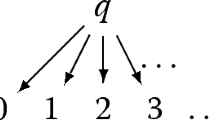Abstract
Game semantics is a valuable source of fully abstract models of programming languages or proof theories based on categories of so-called games and strategies. However, there are many variants of this technique, whose interrelationships largely remain to be elucidated. This raises the question: what is a category of games and strategies?
Our central idea, taken from the first author’s PhD thesis [11], is that positions and moves in a game should be morphisms in a base category: playing move m in position f consists in factoring f through m, the new position being the other factor. Accordingly, we provide a general construction which, from a selection of legal moves in an almost arbitrary category, produces a category of games and strategies, together with subcategories of deterministic and winning strategies.
As our running example, we instantiate our construction to obtain the standard category of Hyland-Ong games subject to the switching condition. The extension of our framework to games without the switching condition is handled in the first author’s PhD thesis [11].
Preview
Unable to display preview. Download preview PDF.
Similar content being viewed by others
References
Abramsky, S.: Semantics and Logics of Computation, chapter Semantics of interaction, pp. 1–31. Cambridge University Press (1997)
Abramsky, S., Honda, K., McCusker, G.: A fully abstract game semantics for general references. In: Proceedings of the thirteenth annual symposium on Logic In Computer Science, pp. 334–344. IEEE Computer Society Press, Los Alamitos (1998)
Abramsky, S., Jagadeesan, R., Malacaria, P.: Full abstraction for PCF. Information and Computation 163(2), 409–470 (2000)
Abramsky, S., McCusker, G.: Full abstraction for Idealized Algol with passive expressions. Theoretical Computer Science 227, 3–42 (1999)
Abramsky, S., Melliés, P.-A.: Concurrent games and full completeness. In: Proceedings of the fourteenth annual symposium on Logic In Computer Science, pp. 431–442. IEEE Computer Society Press, Los Alamitos (1999)
Cockett, R., Seely, R.: Polarized category theory, modules, and game semantics. Theory and Applications of Categories 18, 4–101 (2007)
Danos, V., Regnier, L.: The structure of multiplicatives. Archive for Mathematical Logic 28, 181–203 (1989)
Harmer, R.: Games and Full Abstraction for Nondeterministic Languages. Ph.D. thesis, Imperial College and University of London (1999)
Harmer, R.: Innocent game semantics, Course notes (2005)
Harmer, R., Hyland, M., Melliès, P.-A.: Categorical combinatorics for innocent strategies. Technical report, Paris 7 University (2007)
Hirschowitz, M.: Jeux abstraits et composition catégorique. Thèse de doctorat, Université Paris VII (2004)
Hyland, M., Ong, L.: On full abstraction for PCF. Information and Computation 163(2), 285–408 (2000)
Laird, J.: Full abstraction for functional languages with control. In: Proceedings of the twelfth annual symposium on Logic In Computer Science, pp. 58–67. IEEE Computer Society Press, Los Alamitos (1997)
Laurent, O.: Sémantique des jeux. Course notes (Paris VII) (2004)
Melliés, P.-A.: Double categories: a modular model of multiplicative linear logic. Mathematical Structures in Computer Science 12, 449–479 (2002)
Author information
Authors and Affiliations
Editor information
Rights and permissions
Copyright information
© 2007 Springer-Verlag Berlin Heidelberg
About this paper
Cite this paper
Hirschowitz, M., Hirschowitz, A., Hirschowitz, T. (2007). A Theory for Game Theories. In: Arvind, V., Prasad, S. (eds) FSTTCS 2007: Foundations of Software Technology and Theoretical Computer Science. FSTTCS 2007. Lecture Notes in Computer Science, vol 4855. Springer, Berlin, Heidelberg. https://doi.org/10.1007/978-3-540-77050-3_16
Download citation
DOI: https://doi.org/10.1007/978-3-540-77050-3_16
Publisher Name: Springer, Berlin, Heidelberg
Print ISBN: 978-3-540-77049-7
Online ISBN: 978-3-540-77050-3
eBook Packages: Computer ScienceComputer Science (R0)




